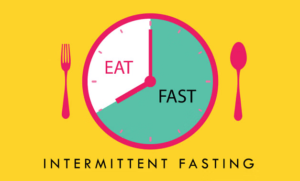Intermittent fasting has become increasingly popular as an effective method for losing weight and improving overall health. This eating pattern involves alternating periods of fasting and eating, and Research has shown that it provides a wide collection of advantages.. In this comprehensive guide, we will explore the concept of intermittent fasting, its benefits, and key points to keep in mind.

What is Intermittent Fasting?
Fasting is not a diet, but it is a way of eating. It involves alternating between periods of fasting and eating.. There are different variations of fasting, but the most common ones include:
- 16/08 method: This method involves fasting for 16 hours and restricting your eating window to 8 hours each day.
- 05:02 diet: Under this method, you eat normally for five days a week and restrict your calorie intake to 500-600 calories on the other two days.
- Alternate-day fasting: As the name suggests, this method involves fasting every other day, with some variations allowing a limited calorie intake on fasting days.
The Benefits of Intermittent Fasting
Fasting offers numerous benefits for both your physical and mental well-being. Here are some of main advantages:
1. Weight Loss and Improved Body Composition
Restricting your eating window can lead to weight loss by naturally reducing calorie intake. Additionally, fasting has been shown to boost your metabolism and increase fat burning, helping you shed excess pounds and improve your body composition.
2. Reduced Insulin Resistance and Blood Sugar Control
It can improve insulin sensitivity and reduce insulin resistance. This approach can prove highly advantageous to individuals who have been diagnosed with type 2 diabetes or who are at risk of developing it. Fasting also helps regulate blood sugar levels, reducing the risk of spikes and crashes throughout the day.
3. Cellular Repair and Autophagy
During fasting, your body undergoes cellular repair processes and activates autophagy, a natural mechanism that removes damaged cells and waste material. This can have anti-ageing effects, promote longevity, and reduce the risk of chronic diseases.
4. Improved Brain Health and Cognitive Function
Studies have shown that fasting can have a positive impact on brain health and cognitive function.. It may enhance brain plasticity, and increase the production of brain-derived neurotrophic factor (BDNF), and Preventive measures can help protect against Alzheimer’s and Parkinson’s diseases.
5. Increased Energy and Enhanced Focus
Several people who practice fasting have reported experiencing heightened energy levels and improved mental clarity. By stabilizing blood sugar levels and promoting the production of ketones, fasting can provide a steady and sustainable source of energy throughout the day.
6. Simplified Meal Planning and Time-Saving
One of the practical benefits of fasting is that it simplifies meal planning. With fewer meals to prepare, you can save time and effort. Additionally, some people find that fasting allows them to have more flexibility in their eating patterns, eliminating the need to constantly think about food.

Key Points to Keep in Mind
Although fasting can have many benefits, it may not be suitable for everyone. Here are some important factors to consider.:
- Consult a healthcare professional: If you have any underlying health conditions or concerns, it’s important to consult with a healthcare professional before starting It.
- Stay hydrated: When you are fasting, it’s essential to ensure that your body remains hydrated, as it can help reduce the feelings of hunger and keep your body functioning properly. It’s recommended that you drink plenty of water, herbal tea, or other non-caloric beverages to replenish the fluids in your body. It’s also crucial to avoid sugary or caffeinated drinks, as they can cause dehydration and further exacerbate the effects of fasting. So, make sure you stay hydrated and drink plenty of water or other non-caloric beverages during your fasting period.
- Listen to your body: It’s crucial to be mindful of your body’s signals when it comes to fasting or eating patterns. If you experience any discomfort or health issues, listen to what your body is telling you and adjust your schedule accordingly. Remember, your well-being should always be your top priority. Take care of yourself and make informed decisions about your eating habits.
- Combine fasting with a balanced diet: Fasting has been known to have several benefits for the body, including weight loss, improved digestion, and better blood sugar control. However, it’s
- important to keep in mind that during the eating window, it’s crucial to provide your body with the necessary nutrients for optimal health. This can be achieved by consuming a balanced diet that consists of whole, nutrient-dense foods. These foods include fresh fruits and vegetables, whole grains, lean proteins, healthy fats, and complex carbohydrates. Additionally, it’s recommended to limit the intake of processed and refined foods, as they may contain harmful additives and preservatives that can have negative effects on the body. By focusing on a diet rich in whole foods, you can help support your overall health and well-being while still enjoying the benefits of fasting.
- Be consistent: When it comes to fasting, maintaining a consistent routine is crucial to achieving the desired results. It’s important to stick to the fasting schedule that you have chosen to ensure that your body can adapt and maximize the potential benefits. Consistency can help your body adjust to the changes in your eating habits, making it easier to fast for longer periods. Additionally, following a consistent fasting schedule can help you avoid overeating or bingeing during your eating windows. So, if you’re looking to get the most out of your fasting routine, remember that consistency is key.
Intermittent fasting is a highly effective method for achieving weight loss, improved health, and overall well-being. It involves alternating periods of eating with periods of fasting, which can help regulate blood sugar levels, reduce inflammation, and boost metabolism. By understanding the concept behind intermittent fasting, as well as its many benefits, you can make an informed decision about whether it’s the right approach for you. It’s important to keep in mind that any significant changes to your eating habits should be done under the guidance of a healthcare professional, who can help ensure that you’re getting all the nutrients your body needs to stay healthy.
If you enjoyed this post, kindly leave a comment. Also, do check out my post on weight loss by clicking here.
